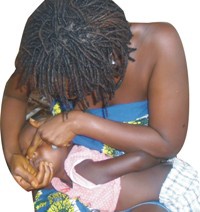Force feeding of babies has long been practiced by most mothers and has more or less been accepted in the society. “If my child doesn’t eat, what should I do”? This has been the prime question that run through the minds of mothers thus compel them to force feed their babies. However, some doctors express their worry about it.
The cry of a baby at birth signifies joy and happiness. As the live morning dew hangs on the leaves so is the heart of a mother who bears a child after the pains and sufferings; the pain of carrying a baby for nine months and the moans and groans at labour. This pain sucks too much energy from mothers to an extent that they look pale in the process and some become susceptible to other ailments, while the pain continues to linger in their eyes. However, at the sound of the baby’s cry, all of the pain is erased.
This baby when born garners all the attention of the mother because of its fragile body and system. Babies from day one to six months are to be breastfed according to the Ministry of Health. However, this advice is most often abused by some mothers who deem six months is too long. Babies are weaned at exactly six months after which ordinary food is introduced.
This is where the problem lies. The introduction of food coupled with how the babies are fed is very critical and most mothers get it wrong hence calls for attention. Most mothers consider this to be a normal practice, but it’s about time all these so called ‘normal practices’ came under careful scrutiny. Let’s educate ourselves a bit with a brief happening on a similar scenario at a detainee camp in Cuba.
Guantanamo Bay is a camp in Cuba that houses detainees. How they became detainees will not be our focus for this piece. As at July 5, there were 164 detainees at the camp, 15 of them went on hunger strike according to the Commander and Spokesman, J.B John Filostrat. Their intention was to embark on a hunger strike for justice, preferring death to indefinite detention without charges. The hunger strikers were the most brutalized of all and were force fed. The force feeding involves snaking plastic tubes through noses down their throats and into their stomach. This lawless incarceration inflicts excruciating pain and reflects disdain for humanity.
Yesiin Bey, popularly known as Mos Def’s, volunteers to undergo this process and his story reflects exactly how they are treated. Looking emaciated and frail, Mos Def is shackled and strapped to a chair with his hands and head tightly belted. One person acting as a prison doctor holds the head while another forces a plastic tube down his nostril. He coughs, groans and twists as the tube rushing down the oesophagus brings tears in his eyes and trickles down his cheeks.
Relating this scenario to what’s practiced by our mothers in Africa, particularly Ghana, this concept of force feeding ought to be treated as a major concern. Some honestly inflict this same excruciating pain on innocent babies unknowingly. This happens when the nose of a baby is held tightly which invariably causes the mouth to open to catch some air. The food and sometimes medicine is immediately forced into the mouth. Can’t there be any other alternate means?
Speaking with ‘Asabea’, a mother of an eight months old baby, she disclosed that the only way to feed the babies when all attempts have proven futile is to force them; unless of course the mother wants to starve them, she added.
‘When persuasion fails, force must be applied’. Janet Grey, a mother of a one-year-old baby added that some babies are too ‘stubborn’ to the extent that regardless of all the pampering and the lullabies you sing for them, they will still refuse to eat. ‘We are sometimes left with no option,' she concluded.
Does that mean force-feeding babies cannot be stopped?
Speaking with Dr. Dsane Aidoo, a Medical doctor at the Ridge Hospital in Accra, he disclosed that this practice has long been discouraged since it poses a lot of health problems to the infant. He explained that it could cause the baby to aspirate causing lung and chest infections. ‘The baby might also suffocate at the long run causing death,' he concluded.
Explaining further, Dr. Manu, Resident of the Development of Child Health of the same hospital shared with me her personal experience of a similar case at the Korle Bu Teaching Hospital which led to the death of a one-year-old baby after ten days admission. ‘The food instead of going down the oesophagus to the stomach missed its path to the lungs causing aspiration and other complications’.
Dr. Manu stated that this perceived normal practice by some mothers can cause pneumonitis if the food passes through the lungs, as well as breakage of some delicate bones and trauma to the nose which can lead to epistasis, nose bleeding.
‘We are working incessantly like the hands of a clock to totally combat this practice,' she assured.
Health News of Tuesday, 6 May 2014
Source: Mavis Boamah - GIJ
Stop force-feeding babies - Doctors admonish

















